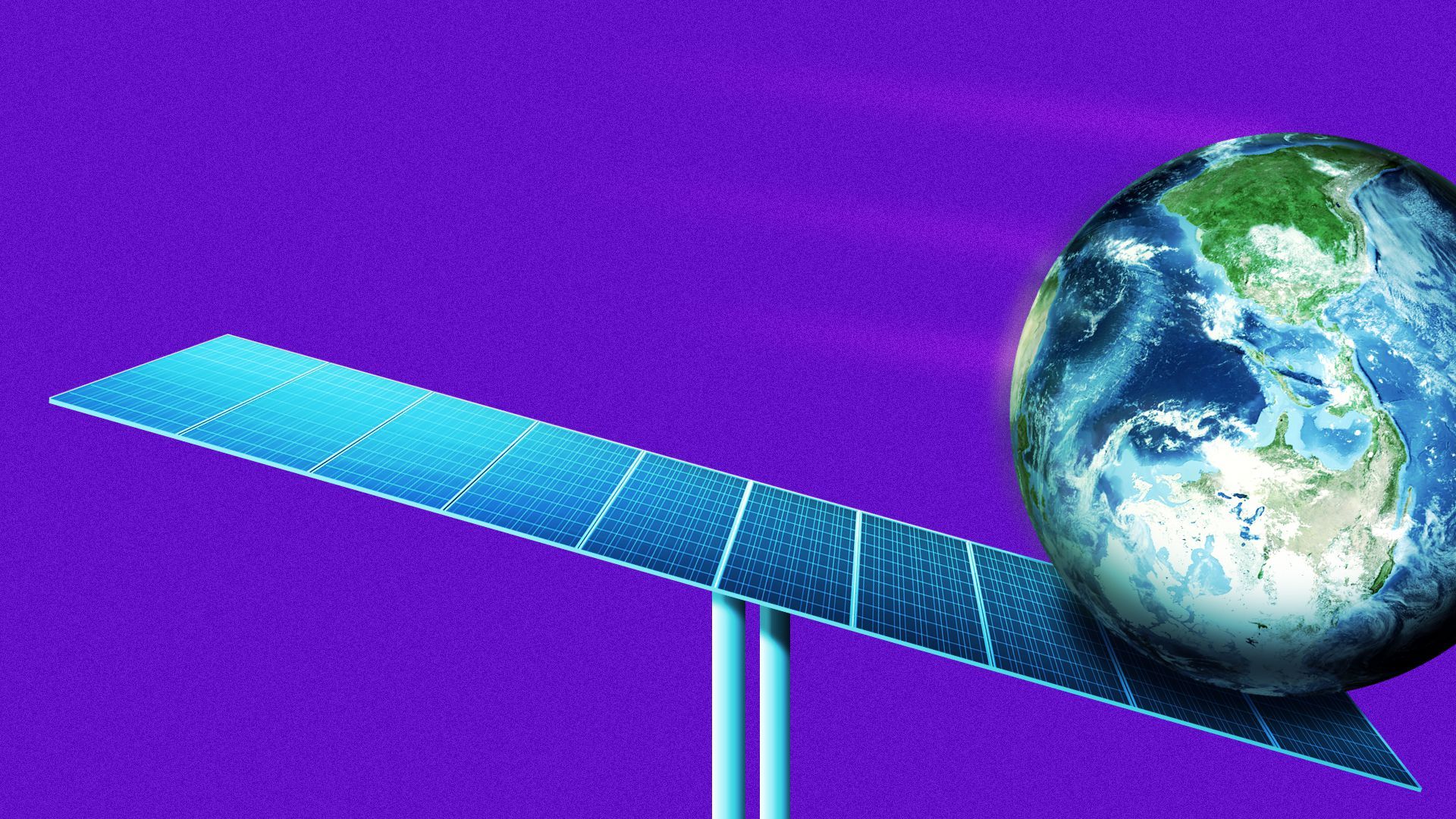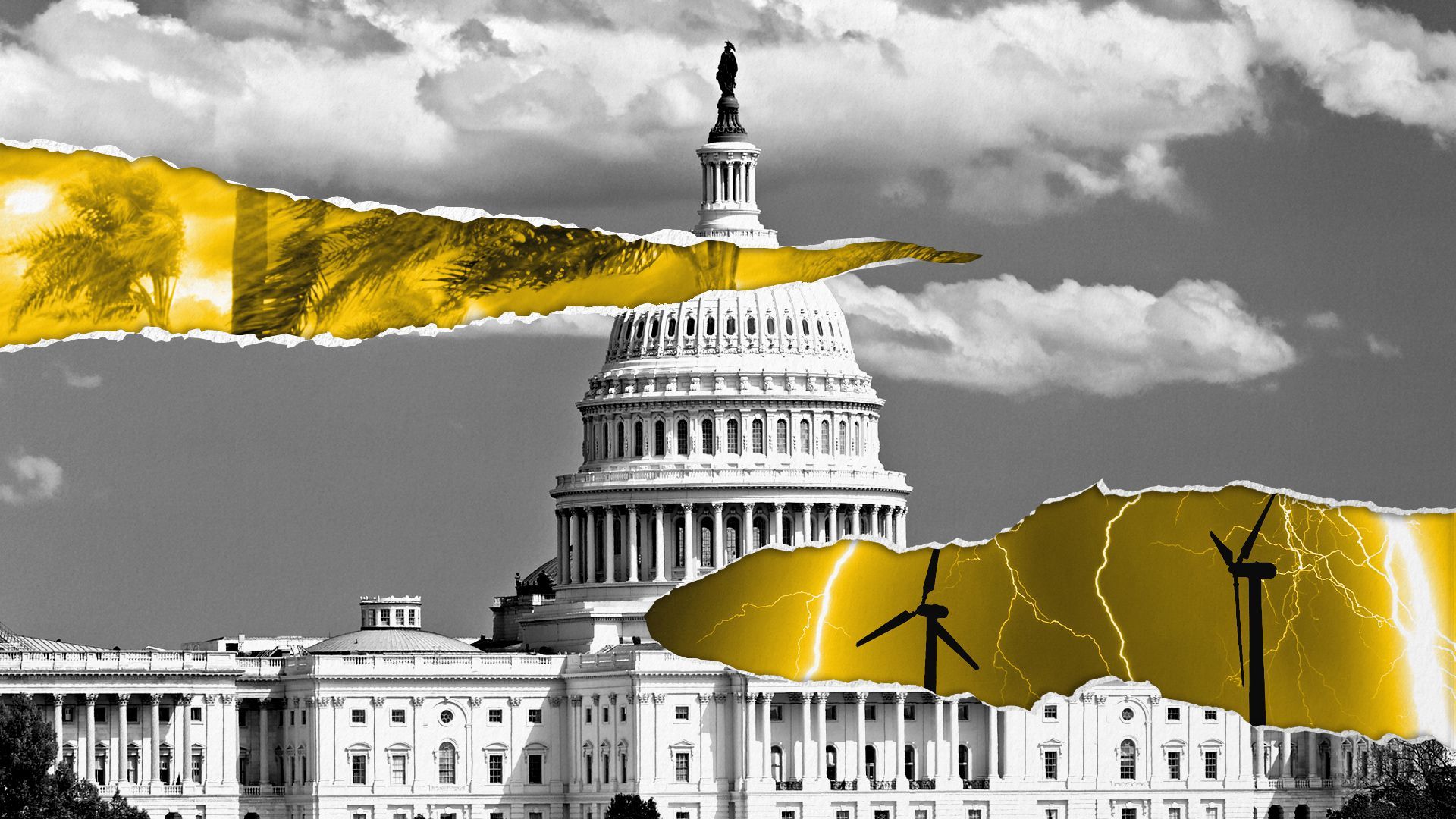| |
| |
| |
| |
| |
| Axios Generate |
| By Ben Geman and Andrew Freedman · Sep 26, 2022 |
| 🍩 Good morning! Today's newsletter has a Smart Brevity count of 1,099 words, 4.5 minutes. 🌀 Situational awareness: Florida is on alert as Ian strengthens into a hurricane. Go deeper. 👀 Join Axios Pro Climate Tech reporter Alan Neuhauser on Tuesday at 12:30pm ET for a virtual event with Energy Department Loan Programs Office head Jigar Shah. Register. 🎶 At this moment in 2006 Beyoncé was #1 on Billboard's album chart with "B'Day," which provides today's intro tune... |
| |
| |
| 1 big thing: A world off-track on clean energy |
 |
|
| Illustration: Sarah Grillo/Axios |
| |
| Just two out of 55 components of the global energy system are on a path consistent with reaching net-zero global greenhouse gas emissions in 2050, the International Energy Agency said, Ben writes. Driving the news: That's the top line from IEA's latest detailed annual tracking report, which uses a three-tier system to assess specific technologies and trends. - It finds that only electric vehicles and lighting are "on track" with IEA's major 2021 analysis of hypothetical pathways for net zero by 2050.
- That's a common benchmark for meeting Paris Agreement goals for limiting how much hotter the planet gets.
Zoom in: Tech in the "not on track" bucket — the lowest tier — include carbon capture, big industrial sectors like cement and steel, and energy efficiency. - Areas in the middle (and most common) "more efforts needed" bucket include renewable power, hydrogen, trends in R&D finance and many others.
- The report assesses everything from mature tech like wind and solar to nascent areas like direct air capture.
Why it matters: It's a tech-by-tech tour of the challenge of accelerating energy transition enough to enable the steep emissions cuts needed to meet those Paris goals. Those global cuts have yet to begin. Each of the 55 areas studied has its own data-rich page that tracks progress and what's needed to improve it. What they're saying: The report late last week highlights positive signs, like initial estimates showing 2022 as another record year for renewable power additions. But overall, it shows the need for "greater and sustained efforts across a range of technologies and sectors," IEA head Fatih Birol said in a statement. |
    |
| |
| |
| Bonus: Charting the pace problem |
 Data: IEA; Chart: Axios Visuals The chart above, via IEA's report, shows global emissions of the powerful planet-warming gas methane from fossil fuels, Ben writes. Why it matters: Methane emissions are in that "not on track" bucket. That 2030 bar shows how much they'd need to fall — and soon! — in IEA's midcentury net-zero pathway. |
    |
| |
| |
| 2. Oil's slide and more petro notes |
 Data: Yahoo Finance; Chart: Axios Visuals Crude oil is trading at its lowest levels since January, with the U.S. benchmark WTI falling well below $80-per-barrel late last week and staying there this morning, Ben writes. Why it matters: The trader hive-mind is feeling pessimistic about the global economy as both WTI and Brent have sunk. - Bloomberg reports the decline stems from the strengthening dollar but also "mounting recessionary concerns" that threaten global oil demand.
What we're watching: How OPEC+ responds when they gather again on Oct. 5 to weigh joint output levels. The union of OPEC, Russia and allied producers announced a very modest trim early this month, so we'll see if they act more aggressively. OK, let's turn from oil to Europe's quest for more LNG to replace the loss of Russian pipelined gas flows. Driving the news: German energy giant RWE yesterday announced a deal with Abu Dhabi National Oil Company for delivery of an LNG cargo late this year. The intrigue: So far it's just one shipment contracted. But beyond that relatively small amount, they have a "memorandum of understanding" on more supplies starting in 2023. Reuters calls it a "politically significant deal to shore up supplies of gas from outside of Russia as Chancellor Olaf Scholz seeks to deepen ties with the Gulf." |
    |
| |
| |
| A message from Chevron |
| At Chevron, we're working to keep up with growing energy demand |
| |
 |
| |
| Chevron is increasing U.S. production to keep up with growing energy demand. By the end of this year, we plan to increase our oil and natural gas production in the Permian Basin by 15% over 2021 levels. And we're expected to reach 1 million barrels of oil per day by 2025. Learn more about our efforts. |
| |
| |
| 3. Big in policy: The permit fight comes to a head |
 |
|
| Photo Illustration: Eniola Odetunde/Axios. Getty Images photos: Rudy Sulgan and Anton Petrus |
| |
| This could be the make-or-break week for Sen. Joe Manchin's bid for legislation to speed up permitting for energy projects including fossil fuel pipelines and power transmission, Ben writes. Driving the news: Senate Majority Leader Chuck Schumer is attaching Manchin's plan to must-pass legislation to fund the government beyond Sept. 30. Manchin secured Schumer's commitment to push the plan when the West Virginia Democrat agreed to support the big climate, tax policy and drug price bill that's now law. The intrigue: It's unclear if Manchin has anything close to the 60 Senate votes needed to keep the proposal alive. - Progressive Democrats dislike the plan. Republicans back the overall aims but want a more aggressive plan. And anyway, GOP lawmakers may be in no mood to help Manchin after he backed the Democrats' climate spending package.
- But Manchin isn't giving up on a bipartisan deal. "He pleaded his case in a Wall Street Journal op-ed over the weekend, paired with plenty of phone calls to colleagues," Politico reports.
- Punchbowl News reports that if the votes aren't there, "Schumer will strip the Manchin proposal from the [continuing resolution] and move ahead anyway."
Why it matters: Clean energy industry officials call it a way to help fully realize the clean energy boom the new climate law envisions. But several climate groups oppose making it easier to build fossil fuel projects. Go deeper. |
    |
| |
| |
| 4. 👀 EPA widens justice push |
| EPA is creating a new office devoted to environmental justice (EJ) and civil rights in the latest sign of the Biden administration's efforts to elevate those topic's prominence in policymaking, Ben writes. Catch up fast: EJ refers to addressing the disproportionate environmental burdens that the poor and communities of color often face. Driving the news: The office will use over 200 EPA staff at agency HQ and regional branches, with a goal of "solving environmental challenges in communities that have been underserved for far too long," EPA said Saturday. The Washington Post has more. |
    |
| |
| |
| 5. One tech thing: How AI could climate-proof crops |
 |
|
| Illustration: Annelise Capossela/Axios |
| |
| Artificial intelligence is guiding plant breeding — and helping to speed up the development of crops that scientists hope can better cope with devastating drought and heat, Axios' Alison Snyder reports. Why it matters: Droughts in China, Europe, East Africa and North America are damaging crops and contributing to food insecurity and hunger around the world. Some of these prolonged dry periods are driven by climate change, others are worsened by it — and they're a window into the drier and hotter future predicted in some regions. The big picture: Those changes in climate, and global food insecurity, are putting pressure on breeders to develop more resilient plants faster. Some companies have been using machine learning and other AI tools for years, but they're becoming more widely available. - Breeders use them to analyze data that reflects what's known about plant biology — for example, how high a plant grows, and whether it can withstand hot or dry conditions in a region.
- That data can help AI predict the combination of genes — and the genes that regulate them — that can improve tolerance without reducing yields.
Read the whole story. |
    |
| |
| |
| 6. 🎤 Quote of the day |
| "It's a very difficult conversation, but it's a conversation that has to be had." — Simon Stiell, the new head of the UN's climate arm, via the Associated PressThat's Stiell on talks over wealthy industrial nations compensating poor countries for climate harms. "Loss and damage" will be key at UN climate negotiations later this year. |
    |
| |
| |
| A message from Chevron |
| At Chevron, we're working to keep up with growing energy demand |
| |
 |
| |
| Chevron is increasing U.S. production to keep up with growing energy demand. By the end of this year, we plan to increase our oil and natural gas production in the Permian Basin by 15% over 2021 levels. And we're expected to reach 1 million barrels of oil per day by 2025. Learn more about our efforts. |
| |
| 📬 Did a friend send you this newsletter? Welcome, please sign up. 🙏Thanks to Mickey Meece and David Nather for edits to today's newsletter. We'll see you back here tomorrow! |
 | | Why stop here? Let's go Pro. | | |










No comments:
Post a Comment